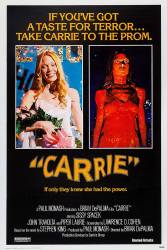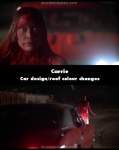Question: Carrie is seen crying after she realizes that Tommy is dead. I can only assume that she actually cared about him but she still believes he was good and didn't take part in the prank, right? And at the end does she actually care about Sue and forgive her?
Answer: Since blood was dumped on him too she must have realized that he wasn't a part of it, so yes, she cared for him. In the book when Carrie touches Sue, they link minds and Carrie sees that Sue felt bad about teasing her and was trying to do something nice to atone, and had nothing to do with Chris' nasty prank. So yes it's safe to say she grieved for Tommy and forgave Sue.
Answer: In this version, Carrie never weeps for Tommy's death, and it's never indicated whether or not she was even aware that he died. And she never directly encounters Sue in this version, so we don't know her thoughts about her either. The film was likely trying to leave some things open-ended, so that audiences could interpret them as they wanted.
Question: Did Tommy die? If so, did his body get burned up?
Answer: He did die in the end when the mother sue was on the phone she mentions "losing tommy and the others" or something like that.
Answer: Most likely he did die. After Carrie set the gym on fire, she walked out and locked the gym doors behind her so that no one could escape, leaving Tommy to die too.
Answer: I've heard it said that the bucket cracked his skull and he died before Carrie's revenge started.
Question: A few of the mistakes point out that certain scenes were shown backward. Why was this done?
Chosen answer: To give the film that extra creepy feel.
Answer: A combination of factors is at play here. Carrie's mother, Margaret, is mentally unstable. She is a staunch fundamentalist Christian. Her daughter, Carrie, is a product of forced intercourse by her drunken husband which her mother admits to having enjoyed, regardless of its sinful nature. Carrie exhibits telekinetic powers, which Margaret labels witchcraft. Carrie goes to the prom against her mother's wishes, which Margaret considers sinful. Margaret ultimately sees her daughter as an evil spawn, imbued with Satanic powers, who is also beginning to assert her independence and defy Margaret's Christian principles. It was probably part of Margaret's delusion that killing her daughter in the midst of prayer (they are reciting "The Lord's Prayer" when Margaret stabs Carrie in the back and continues to attack her) might facilitate her possibility for redemption.
Question: I've been wondering about this for a while: the teacher who befriends Carrie seems to care about her a great deal. Was Carrie just imagining that everyone (including the teacher) was laughing at her or was it real?
Answer: She was just imagining it. She had become so used to being ridiculed by many students, that she was unable to separate out those who actually were kind to her.
In the book, they were all laughing. Some did it intentionally, and some couldn't seem to help themselves, but it was not Carrie's imagination.
Question: Is it me, or is Carrie's mother smiling when she gets stabbed multiple times by Carrie?
Answer: My feeling is that being so fundamentally religious that she was almost happy to finally die, and meet God as she believed.
Answer: She was also crucified, which makes her feel connected to Jesus.
Answer: I think for somebody as repressed as Carrie's mother even something like physical pain is a kind of release (her moans sound sexual to me). Also, remember the mother talking about enjoying Carrie's father touching her? "Hands all over me", there could be a parallel there.
I agree – it almost seemed like she was having an orgasm, or close to it, during her death throes.
Question: Why exactly did Carrie's house collapse at the end? I thought it could be old age, Carrie's powers or the fire, does anyone know?
Answer: The whole idea of the movie and the book is that Carrie is an innocent, harmless young girl with unusual powers, driven over the edge by the cruelties she endures on a daily basis, while her mother is completely insane and uses a warped form of Christianity as an outlet for her madness. In fact, most of Margaret White's supposed "quotes" from the Bible are made up by her. The original answer is correct: Carrie's powers cause the house to collapse.
Answer: We actually just talked about this in my film class, and the consensus was that her surging powers began the house's collapse, and she felt so guilty about killing her mother that she brought the house down so that they would both be dead in it together.
Answer: I perceive it as Carrie's mother was truly the foundation of good and Carrie was possessed by evil. Once her mother was dead the foundation of good was gone and evil was able to take over completely. This explains Carrie's fear as she no longer had any good.
Answer: It's unknown what happens to Mrs. White but, at the end of the novel, a woman says that her daughter has been showing telekinetic abilities and is actually very accepting of this. This implies that Carrie had been reincarnated and been born into a more loving family.
Question: If I'm correct, Carrie's mother (in both the movie and book) believes that Carrie had her period as a sign of some sin. However, the Bible itself has verses that mention periods. Being a religious fanatic who has most likely read the Bible several times, why isn't Carrie's mother aware of menstruation being natural?
Answer: Carrie's mother is not just a fanatic, she is also completely insane. To her, menstruation is a sign of Original Sin, the one committed by Eve in the Garden of Eden, and a mark that all women (and men!) are sinful in themselves.
Question: Why does Carrie stand in front of her mirror and use her powers to break it? I just don't understand why she does this. Does she intentionally break the mirror?
Chosen answer: She believes that she is ugly and unwanted. So her power subconsciously acts accordingly so she won't have to look at herself.
Question: I believe that Carrie did not actually die at the end of the film and is waiting to torment Sue and whoever else messes with her. Anyone adhere to this?
Answer: That was always the impression I got until the sequel was released in 1999 (The Rage: Carrie 2) that made it clear Carrie White was definitively dead.
So her grabbing her arm, what was the purpose for that?
It was a nightmare, never happened, it was just Sue's imagination.
Answer: Her grabbing her arm was a guilt ridden nightmare that Sue had.
Question: Why do Chris and her friends bully Carrie? She's never done anything to them and I've read the book which also provides no answers.
Answer: Bullying doesn't have anything to do with whether or not someone did anything to someone else. Bullies zero in on people they know are emotionally weaker and less able to defend themselves. Carrie was extremely shy, awkward, naive, etc. These are traits that bullies tend to exploit for their own amusement and to make themselves feel superior.
Question: In the beginning of the movie after Carrie goes home after starting her period, her mother starts reading from something about God cursing Eve with blood and the first sin was intercourse. Does anybody know what she was reading from? I can't find it in the Bible, and it doesn't look like that's the kind of book she was holding.
Answer: It seems completely made up for the movie, especially the line "the raven was called sin." In the movie she's holding what looks to be a religious pamphlet, but it's not anything from a real book. In the remake of the film, after her mother says "the curse was the curse of blood", Carrie adds "that's not even in the Bible."
Answer: I took it to be a reference to the Serpent Seed doctrine. Proponents of the Serpent Seed doctrine believe that the Hebrew and Greek words for "deceived" when describing the story of the first sin actually literally translate to "wholly seduce" (They don't). The doctrine goes that the Tree of Knowledge of Good and Evil was actually Satan himself, and that "eating the forbidden fruit" is actually a metaphor for having sex with Satan. The doctrine continues with the claim that Eve's son Cain was actually the spawn of Satan, and that descendants of Cain actually survived the Great Flood and are still among us to this day. The Serpent Seed doctrine has been debunked by many scholars, and there is no evidence from the text of the Bible that it is true, but there are still a lot of religious extremists that believe it.
Question: Why did they change her name from Rita Desjardin, in the book, to Miss Collins?
Answer: The only answer I could find online was that it was changed simply because "Miss Collins" was easier to pronounce/remember. It's also worth noting that it's really not all that uncommon for movie adaptations to alter and rename characters. Especially supporting characters. Given there are some other changes to the character in the movie, renaming her could have also been a way to distance her more from the character in the original book.
Question: What is written on the back of Norma's shirt when she brings the attendance slips to Ms Collins?
Answer: It's either cycnus X*1, or cygnus X*1. I have no idea what that references, but according to Google, cygnus X-1 relates to a black hole. An in-joke maybe, or simply a coincidence, since quirky-lettering shirts were fairly standard in the 70s.







Answer: He starts to genuinely like her, hence his disgusted reaction at the sick practical joke played on her.
Manky